大学英语四级考试 标准答题卡
- 格式:pdf
- 大小:1.26 MB
- 文档页数:4
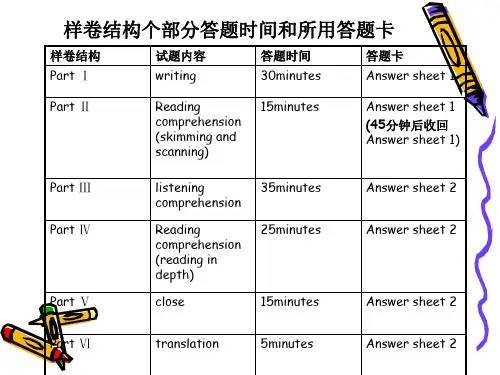
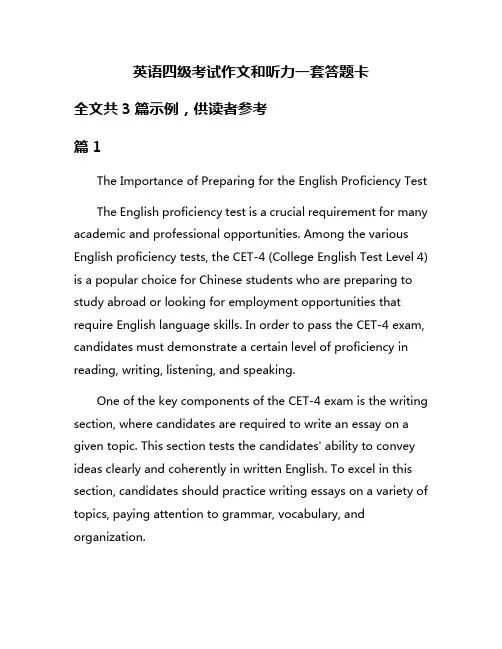
英语四级考试作文和听力一套答题卡全文共3篇示例,供读者参考篇1The Importance of Preparing for the English Proficiency TestThe English proficiency test is a crucial requirement for many academic and professional opportunities. Among the various English proficiency tests, the CET-4 (College English Test Level 4) is a popular choice for Chinese students who are preparing to study abroad or looking for employment opportunities that require English language skills. In order to pass the CET-4 exam, candidates must demonstrate a certain level of proficiency in reading, writing, listening, and speaking.One of the key components of the CET-4 exam is the writing section, where candidates are required to write an essay on a given topic. This section tests the candidates' ability to convey ideas clearly and coherently in written English. To excel in this section, candidates should practice writing essays on a variety of topics, paying attention to grammar, vocabulary, and organization.Another important component of the CET-4 exam is the listening section, where candidates listen to a series of recordings and answer questions based on the content. This section tests the candidates' ability to understand spoken English in different accents and contexts. To prepare for this section, candidates should listen to English podcasts, watch English movies and TV shows, and practice taking listening tests to improve their listening skills.In addition to the writing and listening sections, candidates must also prepare for the reading and speaking sections of the CET-4 exam. The reading section tests the candidates' ability to comprehend written English, while the speaking section tests their ability to communicate verbally in English. To succeed in these sections, candidates should practice reading English texts and engage in conversations in English with native speakers or fellow test-takers.To maximize their chances of success in the CET-4 exam, candidates should develop a comprehensive study plan that includes regular practice in all four language skills – reading, writing, listening, and speaking. Practice tests and mock exams can help candidates familiarize themselves with the format of the exam and identify areas that need improvement. Additionally,seeking guidance from English teachers or tutors can provide valuable feedback and tips on how to improve one's English proficiency.Ultimately, preparing for the English proficiency test requires dedication, consistency, and hard work. By devoting time and effort to improving their English skills, candidates can increase their chances of passing the CET-4 exam and achieving their academic and professional goals.篇2The English proficiency exam is a key part of many international students’ academic journey. For those pursuing a degree in an English-speaking country or looking to demonstrate their language skills for professional purposes, passing a standardized English exam is essential. One of the most popular English proficiency exams is the English four-level exam (CET-4).The CET-4 exam consists of listening, reading, writing, and translation sections, with the listening section often being considered the most challenging by test-takers. The listening section of the CET-4 exam requires candidates to listen to a series of recorded passages and answer questions based on thecontent. This section tests the candidate’s abili ty to comprehend spoken English, as well as their ability to follow and understand different accents, tones, and speeds of speech.To prepare for the listening section of the CET-4 exam, candidates should practice listening to a variety of English accents and dialects. This can be done by listening toEnglish-language podcasts, radio programs, TV shows, and movies. Additionally, candidates can take practice listening tests to familiarize themselves with the format of the exam and the types of questions that may be asked.When taking the listening section of the CET-4 exam, it is important to listen carefully and focus on key details. Candidates should take notes while listening to the passages to help them remember important information and details. It is also helpful to listen for keywords and phrases that may indicate the answer to a particular question.In addition to the listening section, the CET-4 exam also includes a writing section where candidates are required to write an essay on a specified topic. The writing section tests the candidate’s ability to communicate ideas and opinions effectively in written English. To prepare for the writing section,candidates should practice writing essays on a variety of topics and focus on organizing their ideas logically and cohesively.Overall, the English four-level exam is a challenging but important test for international students looking to demonstrate their English language proficiency. By practicing listening to a variety of English accents and dialects, taking practice tests, and honing their writing skills, candidates can increase their chances of success on the exam. With dedication and hard work, passing the CET-4 exam is achievable for anyone looking to prove their English language skills.篇3Title: English CET-4 Exam Essay and Listening Answer SheetIntroduction:The English CET-4 exam is an important milestone for Chinese students aiming to improve their English proficiency. One key component of this exam is the essay writing section and the listening comprehension section. In this article, we will provide tips and strategies for successfully completing these two sections.Essay Writing:The essay writing section of the CET-4 exam requires students to write a 200-250 word essay on a given topic within 30 minutes. To excel in this section, students need to practice their writing skills and develop their ability to express ideas clearly and effectively in English.Tips for writing a successful essay:1. Plan your essay before you start writing. Take some time to brainstorm ideas and create an outline of the main points you want to include.2. Use a variety of sentence structures and vocabulary to make your essay more engaging and interesting to read.3. Stick to the topic and avoid going off on tangents. Make sure every paragraph and sentence contributes to your main argument.4. Proofread your essay carefully to check for grammatical errors, spelling mistakes, and punctuation errors.Listening Comprehension:The listening comprehension section of the CET-4 exam requires students to listen to a series of recordings and answer questions based on what they hear. This section tests students'ability to understand spoken English and extract key information from the audio recordings.Tips for approaching the listening comprehension section:1. Practice listening to English audio materials regularly to improve your listening skills. This could include listening to podcasts, watching TV shows or movies in English, or listening to English songs.2. Pay attention to the instructions and question types before each recording. This will help you know what to listen for and what information to focus on.3. Take notes while listening to the recordings to help you remember key details and information.4. Try to answer as many questions as you can within the given time limit. If you are unsure of an answer, make an educated guess based on the information you have heard.Conclusion:The essay writing and listening comprehension sections of the English CET-4 exam are challenging but manageable with the right preparation and practice. By following the tips and strategies outlined in this article, students can improve theirperformance in these sections and increase their chances of success on the exam. Good luck!。
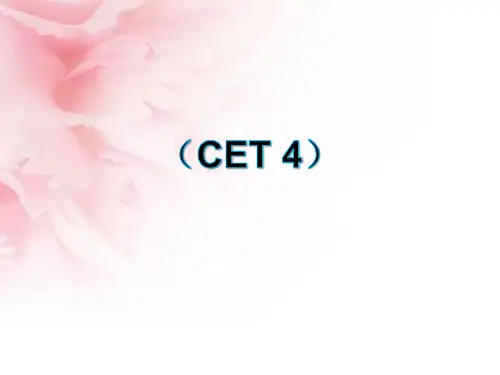
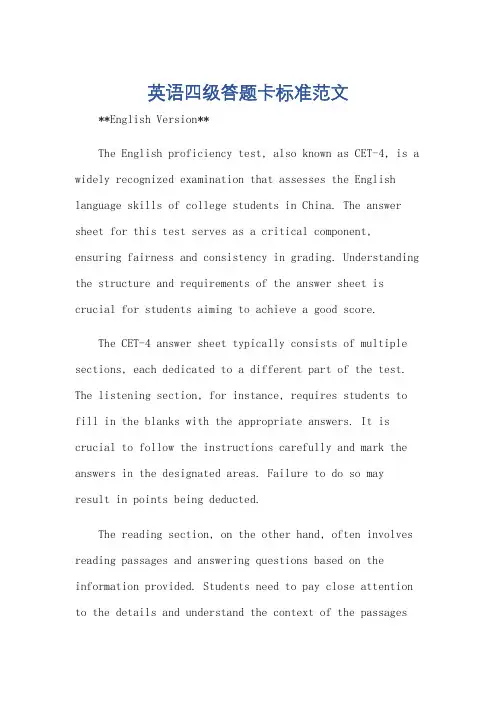
英语四级答题卡标准范文**English Version**The English proficiency test, also known as CET-4, is a widely recognized examination that assesses the English language skills of college students in China. The answer sheet for this test serves as a critical component, ensuring fairness and consistency in grading. Understanding the structure and requirements of the answer sheet is crucial for students aiming to achieve a good score.The CET-4 answer sheet typically consists of multiple sections, each dedicated to a different part of the test. The listening section, for instance, requires students to fill in the blanks with the appropriate answers. It is crucial to follow the instructions carefully and mark the answers in the designated areas. Failure to do so mayresult in points being deducted.The reading section, on the other hand, often involves reading passages and answering questions based on the information provided. Students need to pay close attention to the details and understand the context of the passagesto arrive at the correct answers. Again, marking the answers accurately within the designated spaces is essential.The writing section tests the students' ability to express themselves in English. They are required to write an essay or a composition based on a given prompt. It is important to plan the structure of the essay beforehand and ensure that the ideas are clearly presented and well-supported. Additionally, adhering to the word limit and using appropriate language are crucial for achieving a good score.The translation section tests the students' ability to translate Chinese sentences into English and vice versa. Accuracy and fluency are essential in this section. Students need to have a good grasp of both languages to produce accurate translations.To ensure a high score in CET-4, students should familiarize themselves with the structure and requirements of the answer sheet. They should practice answering questions within the designated spaces and ensure thattheir answers are clear and legible. Moreover, they shouldallocate enough time to each section and avoid rushing through the questions.In conclusion, the CET-4 answer sheet is a crucial component of the examination. Understanding its structure and requirements, along with regular practice, can help students achieve a good score in this widely recognized English proficiency test.**Chinese Version**英语四级考试,即中国大学生的英语水平测试,是一个广受认可的考试。

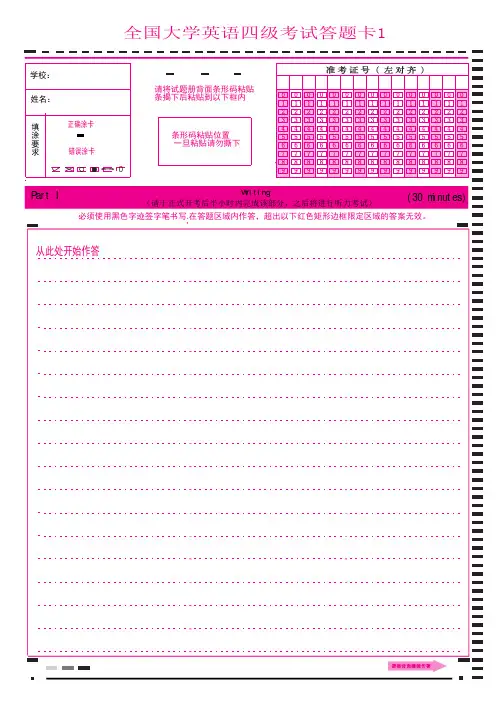
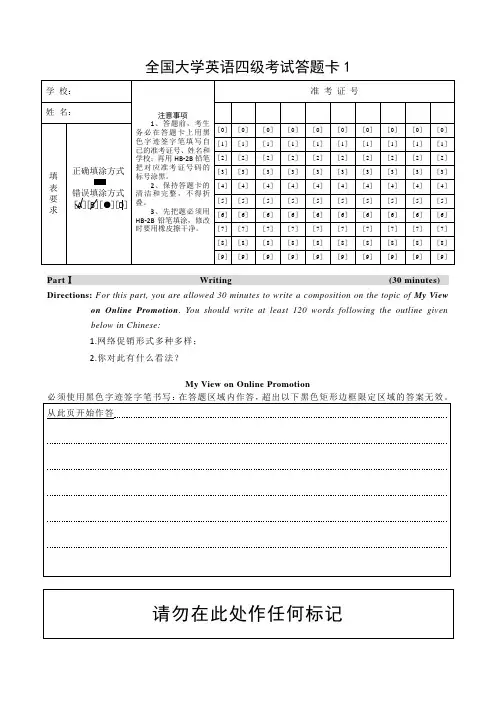
全国大学英语四级考试答题卡1PartⅠWriting (30 minutes) Directions:For this part, you are allowed 30 minutes to write a composition on the topic of My View on Online Promotion. You should write at least 120 words following the outline givenbelow in Chinese:1.网络促销形式多种多样;2.你对此有什么看法?My View on Online Promotion答题卡1必须使用黑色字迹签字笔书写:在答题区域内作答,超出以下黑色矩形边框限定区域的答案无效。
Part Ⅱ Reading Comprehension(Skimming and Scanning) (15 minutes)必须使用黑色字迹签字笔书写:在答题区域内作答,超出以下黑色矩形边框限定区域的答案无效1[A] [B] [C] [D] 2[A] [B] [C] [D] 3[A] [B] [C] [D] 4[A] [B] [C] [D] 5[A] [B] [C] [D] 6[A] [B] [C] [D] 7[A] [B] [C] [D]全国大学英语四级考试答题卡2Part Ⅲ Listening Comprehension 11[A][B][C][D] 16[A][B][C][D] 21[A][B][C][D] 26[A][B][C][D] 31[A][B][C][D] 12[A][B][C][D] 17[A][B][C][D] 22[A][B][C][D] 27[A][B][C][D] 32[A][B][C][D] 13[A][B][C][D] 18[A][B][C][D] 23[A][B][C][D] 28[A][B][C][D] 33[A][B][C][D] 14[A][B][C][D] 19[A][B][C][D] 24[A][B][C][D] 29[A][B][C][D] 34[A][B][C][D] 15[A][B][C][D] 20[A][B][C][D] 25[A][B][C][D] 30[A][B][C][D] 35[A][B][C][D]必须使用黑色字迹签字笔书写:在答题区域内作答,超出以下黑色矩形边框限定区域的答案无效。
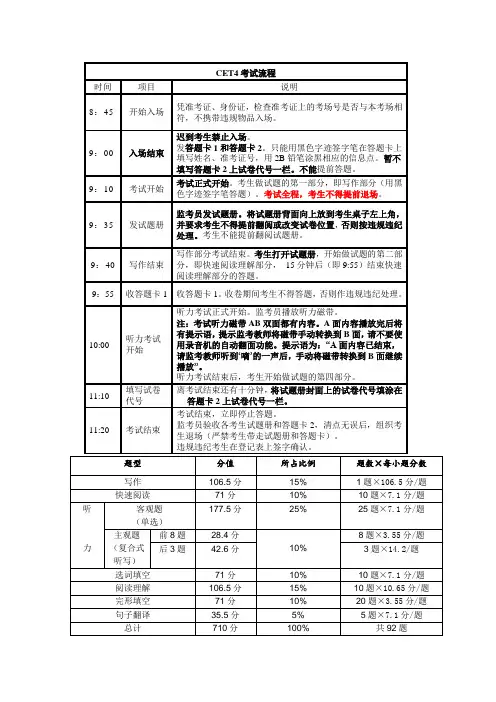
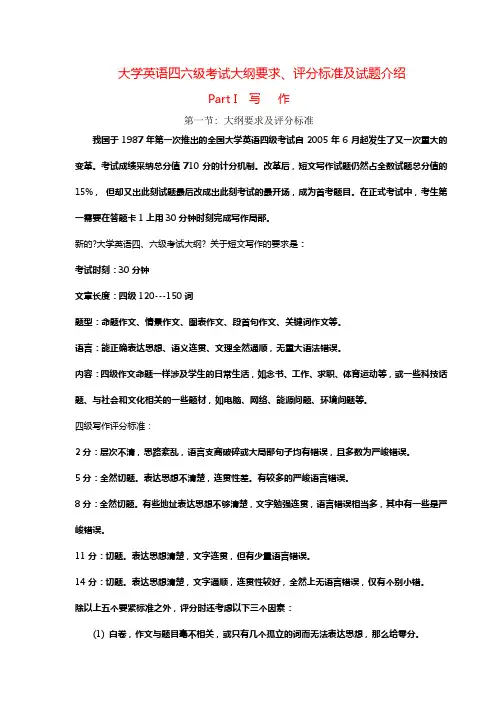
大学英语四六级考试大纲要求、评分标准及试题介绍Part I 写作第一节: 大纲要求及评分标准我国于1987年第一次推出的全国大学英语四级考试自2005年6月起发生了又一次重大的变革。
考试成绩采纳总分值710分的计分机制。
改革后,短文写作试题仍然占全数试题总分值的15%,但却又出此刻试题最后改成出此刻考试的最开场,成为首考题目。
在正式考试中,考生第一需要在答题卡1上用30分钟时刻完成写作局部。
新的?大学英语四、六级考试大纲? 关于短文写作的要求是:考试时刻:30分钟文章长度:四级120---150词题型:命题作文、情景作文、图表作文、段首句作文、关键词作文等。
语言:能正确表达思想、语义连贯、文理全然通顺,无重大语法错误。
内容:四级作文命题一样涉及学生的日常生活,如念书、工作、求职、体育运动等,或一些科技话题、与社会和文化相关的一些题材,如电脑、网络、能源问题、环境问题等。
四级写作评分标准:2分:层次不清,思路紊乱,语言支离破碎或大局部句子均有错误,且多数为严峻错误。
5分:全然切题。
表达思想不清楚,连贯性差。
有较多的严峻语言错误。
8分:全然切题。
有些地址表达思想不够清楚,文字勉强连贯,语言错误相当多,其中有一些是严峻错误。
11分:切题。
表达思想清楚,文字连贯,但有少量语言错误。
14分:切题。
表达思想清楚,文字通顺,连贯性较好,全然上无语言错误,仅有个别小错。
除以上五个要紧标准之外,评分时还考虑以下三个因素:(1) 白卷,作文与题目毫不相关,或只有几个孤立的词而无法表达思想,那么给零分。
(2) 字数缺乏者酌情扣分,所计字数不包括卷面上已给主题句。
(3) 只写一段者0~4分,只写两段者0~9分。
下面通过五份样卷详细介绍四级作文的评分原那么和标准。
Part II 听力第一节大纲要求及评分标准一、四级考试对听力能力的要求在大学英语四级考试中,听力局部占总分的35%。
?大学课程教学全然要求?对学生英语听力能力的一样要求〔即四级水平〕能够量化为:能听懂英语讲课、能听懂日常英语谈话和一样性题材讲座、一遍能全然听懂英语慢速节目,语速130词每分钟,并能运用全然听力技术帮忙明白得中心思想和信息要点,准确率不低于70%。
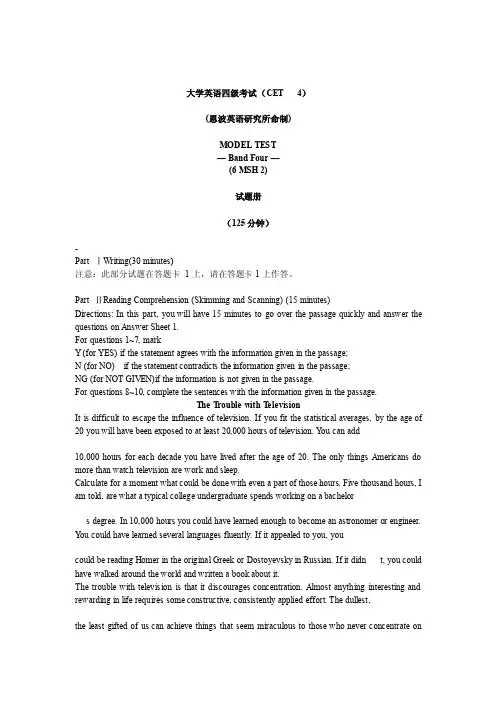
大学英语四级考试(CET 4)(恩波英语研究所命制)MODEL TEST— Band Four —(6 MSH 2)试题册(125分钟)-Part ⅠWriting(30 minutes)注意:此部分试题在答题卡1上,请在答题卡1上作答。
Part ⅡReading Comprehension (Skimming and Scanning) (15 minutes)Directions: In this part, you will have 15 minutes to go over the passage quickly and answer the questions on Answer Sheet 1.For questions 1~7, markY (for YES) if the statement agrees with the information given in the passage;N (for NO) if the statement contradicts the information given in the passage;NG (for NOT GIVEN)if the information is not given in the passage.For questions 8~10, complete the sentences with the information given in the passage.The T rouble with T elevisionIt is difficult to escape the influence of television. If you fit the statistical averages, by the age of 20 you will have been exposed to at least 20,000 hours of television. Y ou can add10,000 hours for each decade you have lived after the age of 20. The only things Americans do more than watch television are work and sleep.Calculate for a moment what could be done with even a part of those hours. Five thousand hours, I am told, are what a typical college undergraduate spends working on a bachelors degree. In 10,000 hours you could have learned enough to become an astronomer or engineer. Y ou could have learned several languages fluently. If it appealed to you, youcould be reading Homer in the original Greek or Dostoyevsky in Russian. If it didn t, you could have walked around the world and written a book about it.The trouble with television is that it discourages concentration. Almost anything interesting and rewarding in life requires some constructive, consistently applied effort. The dullest,the least gifted of us can achieve things that seem miraculous to those who never concentrate onanything. But television encourages us to apply no effort. It sells us instantgratification(满意). It diverts us only to divert, to make the time pass without pain. Television s variety becomes a narcotic(麻醉的), nor a stimulus. Its serial, kaleidoscopic (万花筒般的)exposures force us to follow its lead. The viewer is on a perpetual guidedtour: 30 minutes at the museum, 30 at the cathedral, 30 for a drink, then back on the bus to the next attraction—except on television, typically, the spans allotted arc on theorder of minutes or seconds, and the chosen delights are more often car crashes and people killing one another. In short, a lot of television usurps(篡夺;侵占)one of the mostprecious of all human gifts, the ability to focus your attention yourself, rather than just passively surrender it.Capturing your attention—and holding it—is the prime motive of most television programming and enhances its role as a profitable advertising vehicle. Programmers live in constantfear of losing anyone s attention—anyone s. The surest way to avoid doing so is to keep everything brief, not to strain the attention of anyone but instead to provide constantstimulation through variety, novelty, action and movement. Quite simply, television operates on the appeal to the short attention span.It is simply the easiest way out. But it has come to be regarded as a given, as inherent in the medium itself; as an imperative, as though General Sarnoff, or one of the other augustpioneers of video, had bequeathed(遗留;传于)to us tablets of stone commanding that nothing in television shall ever require more than a few moments Concentration.In its place that is fine. Who can quarrel with a medium that so brilliantly packages escapist entertainment as a mass marketing tool? But I see its values now pervading this nationand its life. It has become fashionable to think that, like fast food, fast ideas are the way to get to a fast moving, impatient public.In the case of news, this practice, in my view, results in inefficient communication. I question how much of television s nightly news effort is really absorbable and understandable.Much of it is what has been aptly described as “machine gunning with scraps.”I think the technique fights coherence. I think it tends to make things ultimately boring (unless theyare accompanied by horrifying pictures) because almost anything is boring if you know almost nothing about it.I believe that TV s appeal to the short attention span is not only inefficient communication but decivilizing as well. Consider the casual assumptions that television tends tocultivate: that complexity must be avoided, that visual stimulation is a substitute for thought, thatverbal precision is an anachronism. It may be old fashioned, but I was taughtthat thought is words, arranged in grammatically precise.There is a crisis of literacy in this country. One study estimates that some 30 million adult Americans are “functionally illiterate” and cannot read or write well enough to answer thewant ad or understand the instructions on a medicine bottle.Literacy may not be an inalienable human right, but it is one that the highly literate Founding Fathers might not have found unreasonable or even unattainable. We are not only notattaining it as a nation, statistically speaking, but we are falling further and further short of attaining it. And, while I would not be so simplistic as to suggest that television is thecause, I believe it contributes and is an influence.Everything about this nation—the structure of the society, its forms of family organization, its economy, its place in the world—has become more complex, not less. Y et itsdominating communications instrument, its principal form of national linkage, is one that sells neat resolutions to human problems that usually have no neat resolutions. It is allsymbolized in my mind by the hugely successful art form that television has made central to the culture, the 30 second commercial: the tiny drama of the earnest housewife whofinds happiness in choosing the right toothpaste.When before in human history has so much humanity collectively surrendered so much of its leisure to one toy, one mass diversion? When before has virtually an entire nationsurrendered itself wholesale to a medium for selling?Some years ago Y ale University law professor Charles L. Black. Jr. wrote: “… forced feeding on trivial fare is not itself a trivial matter. I think this society is being forced, fed with trivialfare, and I fear that the effects on our habits of mind, our language, our tolerance for effort, and our appetite for complexity are only dimly perceived. If I am wrong, we will havedone no harm to look at the issue skeptically and critically, to consider how we should be residing it. I hope yo u will join with me in doing so.”注意:此部分试题在答题卡1上作答;8~10题在答题卡1上。
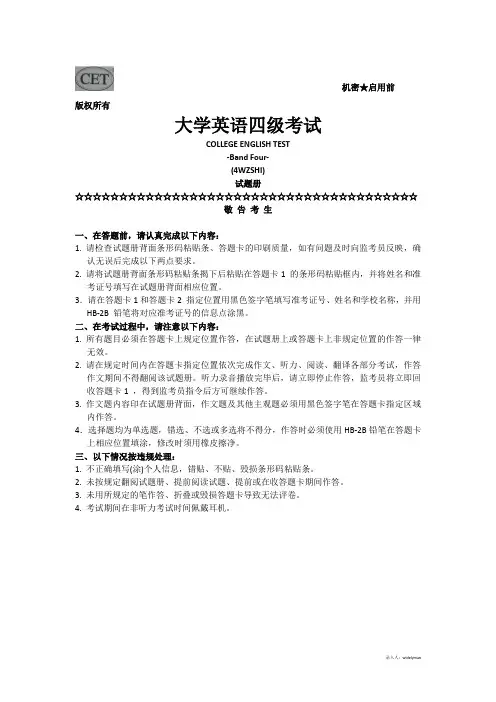
机密★启用前版权所有大学英语四级考试COLLEGE ENGLISH TEST-Band Four-(4WZSHI)试题册☆☆☆☆☆☆☆☆☆☆☆☆☆☆☆☆☆☆☆☆☆☆☆☆☆☆☆☆☆☆☆☆☆☆☆☆☆☆☆敬告考生一、在答题前,请认真完成以下内容:1. 请检查试题册背面条形码粘贴条、答题卡的印刷质量,如有问题及时向监考员反映,确认无误后完成以下两点要求。
2. 请将试题册背面条形码粘贴条揭下后粘贴在答题卡1 的条形码粘贴框内,并将姓名和准考证号填写在试题册背面相应位置。
3.请在答题卡1和答题卡2 指定位置用黑色签字笔填写准考证号、姓名和学校名称,并用HB-2B 铅笔将对应准考证号的信息点涂黑。
二、在考试过程中,请注意以下内容:1. 所有题目必须在答题卡上规定位置作答,在试题册上或答题卡上非规定位置的作答一律无效。
2. 请在规定时间内在答题卡指定位置依次完成作文、听力、阅读、翻译各部分考试,作答作文期间不得翻阅该试题册。
听力录音播放完毕后,请立即停止作答,监考员将立即回收答题卡1 ,得到监考员指令后方可继续作答。
3. 作文题内容印在试题册背面,作文题及其他主观题必须用黑色签字笔在答题卡指定区域内作答。
4.选择题均为单选题,错选、不选或多选将不得分,作答时必须使用HB-2B铅笔在答题卡上相应位置填涂,修改时须用橡皮擦净。
三、以下情况按违规处理:1. 不正确填写(涂)个人信息,错贴、不贴、毁损条形码粘贴条。
2. 未按规定翻阅试题册、提前阅读试题、提前或在收答题卡期间作答。
3. 未用所规定的笔作答、折叠或毁损答题卡导致无法评卷。
4. 考试期间在非听力考试时间佩戴耳机。
Section A Litstening Comprehension (30 minutes)Directions: In this section, you will hear 8 short conversations and 2 long conversations. At the end of each conversation. one or more questions will be asked about what was said.Both the conversation and the questions will be spoken only once. After eachquestion there will be a pause. During the pause, you must read the four choicesmarked A), B), C) and D), and decide which is the best answer. Then mark thecorresponding letter on Answer Sheet 1 with a single line through the centre.注意:此部分试题请在答题卡1 上作答1. A) They admire the courage of space explorersB) They enjoyed the movie on space explorationC) They were going to watch a wonderful movieD) They like doing scientific exploratron very much2. A)At a gift shopB) At a graduation ceremony.C) In the office of a travel agencyD) In a school library3. A) He used to work in the art galleryB) He does not have a good memoryC) He declined a job offer from the art galleryD) He is not interested in any part-time jobs4. A) Susan has been invited to give a lecture tomorrowB) He will go to the birthday party after the lectureC) The woman should have informed him earlierD) He will be unable to attend the birthday party5. A) Reward those having made good progressB) Set a deadline for the staff to meetC) Assign more workers to the project.D) Encourage the staff to work in Small groups6. A) The way to the visitor's parkingB) The rate for parking in Lot CC) How far away the parking lot is.D) Where she can leave her car.7. A) He regrets missing the classesB) He plans to take the fitness classes.C) He is looking forward to a better lifeD) He has benefited from exercise8. A) How to raise work efficiency.B) How to select secretariesC) The responsibilities of secretanesD) The secretaries in the man’s company.Questions 9 to 11 are based on the conversation you have just heard.9 A) It Is more difficult to learn than EnglishB) It is used by more people than English.C) It will be as commonly used as EnglishD) It will eventually become a world language10. A) Its loan words from many languagesB) Its popularity with the common people.C) The influence of the British EmpireD) The effect of the Industrial Revolution11. A) It includes a lot of words from other languagesB) It has a growing number of newly coined wordsC) It can be easily picked up by overseas travellersD) It is the largest among all languages in the worldQuestions 12 to 15 are based on the conversation you have just heard.12. A) To return some goodsB) To apply for a job.C) To place an order.D) To make a complaint13. A) He has become somewhat impatient with the womanB) He is not familiar with the exact details of the goodssC) He has not worked in the sales department for long.D) He works on a part-time basis for the company14. A) it is not his responsibilityB) It will be free for large ordersC) It costs £15 more for express deliveryD) It depends on a number of factors15. A) Report the information to her superiorB) Pay a visit to the saleswoman in chargegeC) Ring back when she comes to a decisionD) Make inquiries with some other companiesSection BDirections: In this section, you will hear 3 short passages. At the end of each passage, you will hear some questions. Both the passage and the questions will be spoken onlyonce.After you hear a queslion, you must choose the best answer from the fourchoices marked A), B), C) and D). Then mark the corresponding leltert on AnswerSheet 1 with a single line through the centre注意:此部分试题请在答题卡1 上作答。
全国研究生英语四级考试答题卡1
填写说明
- 在答题卡上,按照题号将各题答案涂黑。
- 答案必须填写在答题卡上,否则不得分。
- 使用2B铅笔将答题卡上对应题目的正确答案涂黑,不能答在试卷上。
注意事项
- 答案涂写要认真、清晰、规范,不能答在试卷上。
- 答题卡上的答案一定要涂黑,不能使用其他颜色笔,也不能使用划线、叉圈等标记答案。
- 每题只能选一个答案,多选、错选都不得分。
- 如果要改变答案,必须用橡皮擦干净。
- 涂写时请务必将答题卡上的"姓名"和"考号"用2B铅笔填写清楚,保持答题卡的干净整洁。
涂写方法
1. 在每道题的答题区域内,用2B铅笔把自己认为正确的选项涂黑。
2. 涂黑时请注意不要超出题目区域,否则会影响机读结果。
3. 确认无误后,请使用橡皮擦干净答题区域以外的铅笔痕迹。
注意事项
- 请仔细填写自己的考号、姓名、座位号、题号等信息,防止错位和丢失。
范例
|1|2|3|4|5|6|7|8|9|...|
|:-|:-|:-|:-|:-|:-|:-|:-|:-|---|
|A|B|C|D|D|C|B|A|D|...|
> 注意:本文档只提供答题卡填写说明和范例,具体题目请参考考试的原始试卷,谢谢。
祝您考试顺利!。
英语四级答题卡标准范文Section 1: Listening Comprehension.1. The speaker's purpose in this lecture is to:(A) Explain the history of jazz music.(B) Analyze the different elements of jazz music.(C) Discuss the influence of jazz music on other genres.(D) Teach students how to play jazz music.2. According to the speaker, one of the defining characteristics of jazz music is its:(A) Use of improvisation.(B) Complex harmonic structures.(C) Strict adherence to traditional forms.(D) Emphasis on melody.3. The speaker mentions that jazz music originated in the early 20th century in the city of:(A) New Orleans.(B) Chicago.(C) New York City.(D) Paris.4. Which of the following instruments is mentioned by the speaker as being typically used in jazz music?(A) Violin.(B) Saxophone.(C) Clarinet.(D) Flute.5. The speaker suggests that one of the reasons for the enduring popularity of jazz music is its:(A) Ability to adapt and evolve.(B) Accessibility to audiences of all ages.(C) Association with the civil rights movement.(D) Educational value.Section 2: Reading Comprehension.Passage 1。